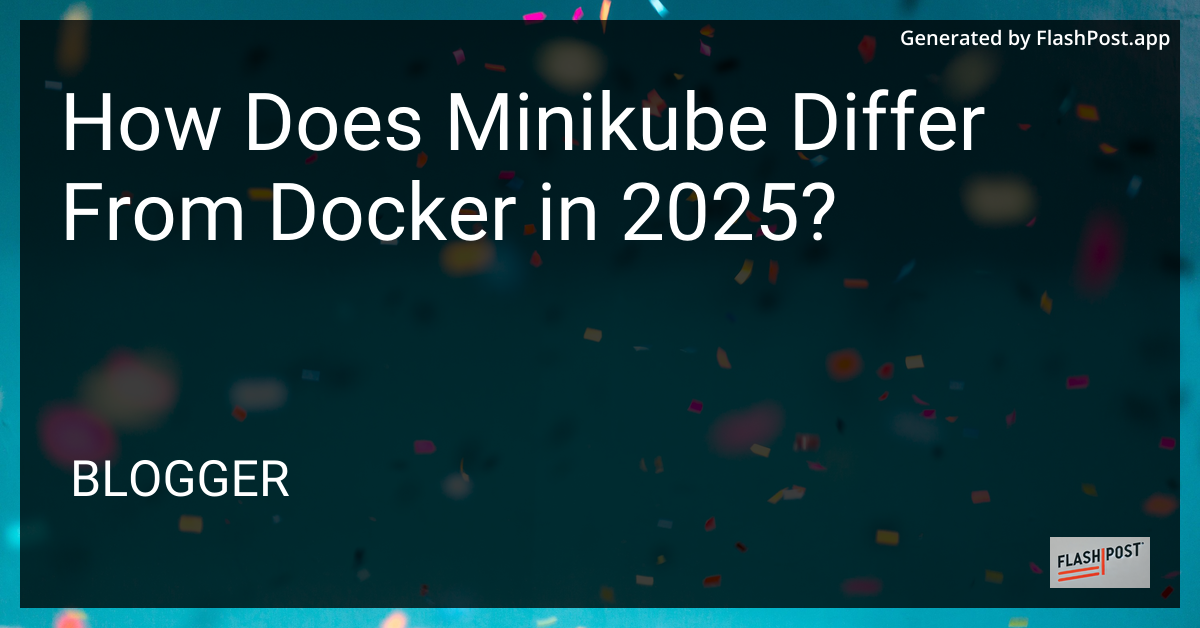How Does Minikube Differ From Docker in 2025?

How Does Minikube Differ from Docker in 2025?
In the ever-evolving world of container orchestration and development, understanding the differences between platforms like Minikube and Docker is crucial for developers, IT professionals, and businesses. As of 2025, while both tools are pivotal in managing containerized applications, they serve distinct purposes and functionalities. This article delves into the core differences between Minikube and Docker, helping you make informed decisions for your projects.
Minikube: A Local Kubernetes Solution
Minikube is primarily designed to facilitate local development of Kubernetes clusters. Its goal is to provide a local environment that simulates a production Kubernetes cluster, allowing developers to create a cluster and test Kubernetes features without the overhead of a full-scale production deployment. Here are some key aspects:
- Local Kubernetes Setup: Minikube allows you to run Kubernetes locally, offering a simpler entry point to Kubernetes for developers who need a fast and lightweight setup for testing and development.
- Support for Multi-Node Clusters: As of 2025, Minikube now supports multi-node clusters which provide greater flexibility for testing distributed applications.
- Testing Kubernetes Features: With Minikube, developers can experiment with the latest Kubernetes features, extensions, and services in a controlled environment.
- Resource Management: It allows for resource constraint testing, providing insights into how an application might perform under different conditions.
Docker: The Containerization Standard
Docker, on the other hand, has established itself as the go-to tool for containerization. While it no longer includes the Docker Swarm for orchestration as of 2024, its primary focus rests on simplifying the process of container building and managing individual containers. Key features include:
- Container Image Management: Docker provides robust tools for creating, sharing, and running container images, making it a staple for containerized application development.
- Lightweight and Portable: Docker containers are highly portable across different environments, ensuring consistent behavior from local setups to production.
- Integration with CI/CD pipelines: Docker integrates seamlessly with continuous integration and continuous deployment processes, enhancing productivity.
- Broad Ecosystem: Docker boasts a vast ecosystem, with extensive community support and a wealth of official and community images available through Docker Hub.
Key Differences in 2025
By 2025, the fundamental differences between Minikube and Docker remain centered on scope and use cases:
- Purpose and Scope: Minikube is specifically designed for testing Kubernetes clusters locally, whereas Docker focuses on containerization irrespective of orchestration.
- Scale: Minikube supports multi-node cluster setups for local development, whereas Docker operates effectively in individual container isolation.
- Ecosystem Integration: Docker has strong industry recognition and deep integration capabilities with various development tools and cloud services, while Minikube is tightly coupled with Kubernetes testing and development.
Conclusion
While both Minikube and Docker are invaluable tools in the developer’s toolkit in 2025, their distinct functionalities cater to varied stages of application development. Minikube provides a seamless local Kubernetes experience, ideal for exploring and testing clusters, whereas Docker continues to spearhead containerization, offering unmatched ease of use and flexibility. Deciding which to use depends crucially on your project’s needs, resources, and long-term objectives. Understanding these differences empowers you to leverage both tools effectively in the dynamic realm of software development.
Comments
Post a Comment